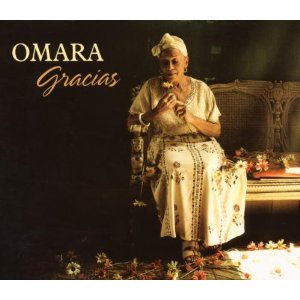
This musical legend, considered the best Cuban singer nowadays and the most influenced by US music, was a Tropicana dancer, member of the group Loquibambia, with maestro Frank Emilio, one of the voices of the quartet D’Aida and shared Havana nights with Nat King Cole and Edith Piaf.
Gracias starts with Yo vi (J´ai vu), a delicate a song by the late French singer Henri Salvador of whom Omara commented "its gives a huge peace sensation and reminded her of the Caribbean".
She included some songs written by Milanes, such as Ámame como soy – that she already sang with Elena Burke – and Tú mi desengaño.
She added that it is surprising, it is the first time she records something written by the singer from Bayamo. "I always said to Pablo, you make the songs only for you, for you to sing them´. And he used to laugh, as saying ´this girl is amazing, she says some things´.
"I still believe that nobody can sing his songs as he does, but now I did", she assured in an interview to Spain’s El Pais newspaper.
Nevertheless she was the first one to make popular a song written by Silvio Rodriguez, La era está pariendo un corazón. "I still sing it, because people keep asking me this song. I think it was dedicated to Che Guevara. Pablo and Silvio knew each other through me, because I heard Silvio in a TV program and said to Pablo ‘there is a guy with some beautiful songs´".
Gracias is produced by Brazilians Alê Siqueira (Tribalistas) and Swami Jr and Chico Buarque takes part in the record, singing with her the song O que será.
"We Cubans love Brazilian music, first, because they have a wonderful way of making music, beautiful texts, melodies, rhythms and also because Brazil and Cuba have many things in common, including the Yoruba religion. It is said that the slaves brought to Brazil were from the same African religion as the Cuban slaves. Everything has its influence. The Brazilian people are positive, they are always happy", she ended.
Translation: Rodney Lopez (Cubarte)
Source: Cubarte/Cubasi
Buy the CD:
Author: World Music Central News Room
World music news from the editors at World Music Central


